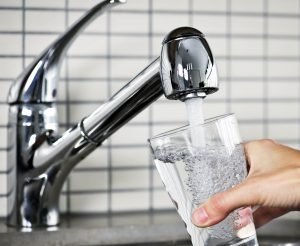Funding Opportunities
Water Resources Research Institute Grant Program
 At the land grant university of each state, a small federal grant provides base support for a program that identifies water resources research needs, finds university researchers capable of conducting useful research, and leverages federal funds with state and other resources to sponsor the needed investigations. The State Water Resources Research Institute Program (WRRI) is administered by the U.S. Department of the Interior through the U.S. Geological Survey.
At the land grant university of each state, a small federal grant provides base support for a program that identifies water resources research needs, finds university researchers capable of conducting useful research, and leverages federal funds with state and other resources to sponsor the needed investigations. The State Water Resources Research Institute Program (WRRI) is administered by the U.S. Department of the Interior through the U.S. Geological Survey.
As Maine’s congressionally authorized water institute, the Senator George J. Mitchell Center receives base funding through the U.S. Geological Survey to operate programs tailored to meet Maine’s water resource needs.
- Maine WRRI 104(g) Funded Projects
- Developing and Deploying a Risk Framework for PFAS Management in Rural America. PIs: David Hart and Caroline Noblet (2021)
- Investigation of Harmful Algal Bloom effects on Amnesic Shellfish Poisoning through Decision Support Tools in Connected Watershed-Estuary Systems. PI: Lauren Ross (2020)
- Using paleolimnological and sedDNA reconstructions to assess links between warmer winters and summer cyanoHABs in Maine’s lakes. PI: Jasmine Saros (2020)
- Maine WRRI 104(b) Funded Projects
- Investigating Shoreline Impacts Of Boat Wakes & Understanding Stakeholder Response: A Case Study Of East Pond (2024)
- Guiding Sustainable Enhanced PFAS Drinking Water Treatment Options (2024)
- Socio‐Economic and Environmental Analyses for Using Woody Biochar to Conserve Water and Sustain Agriculture in Maine (2023)
- Shifting Seasonality: Consequences of the changing autumn season for Maine’s ecologically and recreationally valuable mountain ponds (2023)
- Hydrologic and hydraulic performance of novel shallow wells in agricultural landscapes (2023)
- Interpreting the extent and characteristics of microplastics pollution in Maine freshwater streams to guide a holistic mitigation strategy – 2022
- Relative impacts of human-induced and natural wave erosion and deposition processes on large alum treated lakes: A case study on East Pond – 2022
- Valuing the Economic Benefits of Maine’s Great Ponds in the 21st Century -2022
- Integrated Assessment of Alternative Management Strategies for PFAS-contaminated Wastewater Residuals -2021
- Tracking the Effects of Forest Disturbances and Climate Change on Headwater Streams in Northern Maine – 2021
- Stakeholders, Earth Scientists, Designers and Planners Can Shape the Dynamics of River Restoration – 2021
- Farms and Rivers for the Future – 2020
- Reducing Unnecessary Closures in Maine’s Shellfish Growing Areas – 2020
- Using Socio-Economic Impacts to Inform Decision-Making on Dams – 2020
- Upgrading Culverts for Safer Roads and Healthier Ecosystems – 2019
- Enhancing the Scientific Basis for Predicting the Response of Coastal Maine Estuaries to Polluted Freshwater Runoff – 2019
- Characterizing Estuary Watersheds that Substantially Influence Coastal Bacteria Pollution Trends – 2018
- Evaluating Success in Group Decision-Making Processes for River Systems – 2018
- Maine’s Changing Winter: Focus on natural resources, ecology, and the economy – 2017
- Contamination of Messalonskee Lake by pharmaceuticals and chemicals in personal care products – 2017
- Improved delineation and analysis of Flood Attenuation in Maine’s watersheds – 2017
- Real Time Date for Sebago Lake – 2017
- Vernal Pools for Me – 2016
- Mining in Maine: Exploring Public Perception – 2016
- Assessing the Vulnerability of Maine’s Drinking Water Resources to Extreme Precipitation Events – 2016
